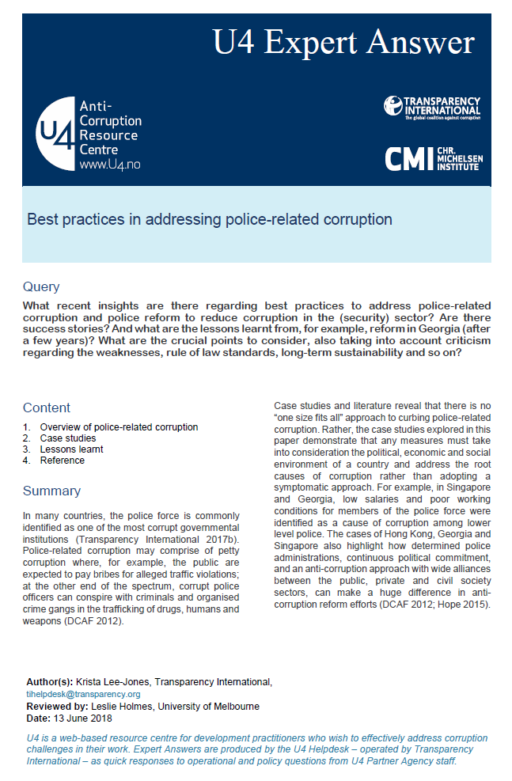
This Anti-Corruption Helpdesk brief was produced in response to a query from a U4 Partner Agency. The U4 Helpdesk is operated by Transparency International in collaboration with the U4 Anti-Corruption Resource Centre based at the Chr. Michelsen Institute.
Query
What recent insights are there regarding best practices to address police-related corruption and police reform to reduce corruption in the (security) sector? Are there success stories? And what are the lessons learned from, for example, reform in Georgia (after a few years)? What are the crucial points to consider, also taking into account criticism regarding the weaknesses, rule of law standards, long-term sustainability and so on?
Key Messages
The police force is commonly identified as one of the most corrupt governmental institutions. The cases of Hong Kong, Georgia and Singapore highlight how determined police administrations, continuous political commitment, and an anti-corruption approach with wide alliances between the public, private and civil society sectors, can make a huge difference in anti-corruption reform efforts.
Content
- Overview of police-related corruption
- Case studies
- Lessons learnt
- Reference
Summary
In many countries, the police force is commonly identified as one of the most corrupt governmental institutions (Transparency International 2017b). Police-related corruption may comprise of petty corruption where, for example, the public are expected to pay bribes for alleged traffic violations; at the other end of the spectrum, corrupt police officers can conspire with criminals and organised crime gangs in the trafficking of drugs, humans and weapons (DCAF 2012).
Case studies and literature reveal that there is no “one size fits all” approach to curbing police-related corruption. Rather, the case studies explored in this paper demonstrate that any measures must take into consideration the political, economic and social environment of a country and address the root causes of corruption rather than adopting a symptomatic approach.
For example, in Singapore and Georgia, low salaries and poor working conditions for members of the police force were identified as a cause of corruption among lower level police. The cases of Hong Kong, Georgia and Singapore also highlight how determined police administrations, continuous political commitment, and an anti-corruption approach with wide alliances between the public, private and civil society sectors, can make a huge difference in anti-corruption reform efforts (DCAF 2012; Hope 2015).
Authors
Krista Lee-Jones, [email protected]
Reviewer
Leslie Holmes, University of Melbourne
Date
20/09/2018

